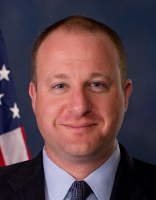Widgetized Section
Go to Admin » Appearance » Widgets » and move Gabfire Widget: Social into that MastheadOverlay zone
‘Trump administration needs to back off’ on legal marijuana, U.S. Rep. Polis says
Sen. Gardner to meet with Attorney General Sessions to stand up for states' rights

Green Essentials in Glenwood Springs (Photo by Kent Kanouse).
U.S. Rep. Jared Polis, the Boulder Democrat who represents the Vail Valley in Congress, was sharply critical of Thursday’s decision by U.S. Attorney General Jeff Sessions to reverse the Cole Memo and potentially target states like Colorado that have legalized marijuana.

U.S. Rep. Jared Polis, D-Boulder
“It is absurd that Attorney General Sessions has broken [President Donald] Trump’s campaign promise and is now waging war on legal marijuana and states’ rights. The growing Colorado economy is in jeopardy with the news that the Attorney General will now go after states that have decided to regulate marijuana,” Polis said Thursday.
Polis was joined in his outrage by Colorado Republican U.S. Sen. Cory Gardner, who blasted both Sessions and Trump for meddling in state affairs. Gardner promised to hold up Justice Department nominations, prompting a meeting with the stridently anti-pot attorney general.
“Before January 4, 2018, the Justice Department allowed the states to decide what to do with legal marijuana, and in 2016 when President Trump visited Colorado as a candidate, he stated he thought this should be left up to states like Colorado to decide,” Gardner said in a release. “And before I voted to confirm Attorney General Sessions, he assured me that marijuana would not be a priority for this administration.

Sen. Cory Gardner
“The Attorney General’s action this week directly contradicts what I was told, and I am prepared to take all steps necessary, including holding DOJ nominees, until the Attorney General lives up to the commitment he made to me prior to his confirmation,” Gardner added. “While I did not agree with marijuana legalization when it was on the ballot in 2012, the voters of Colorado made their decision and the federal government must respect the will of the voters. I agree with President Trump when he said marijuana legalization should be left up to the states and I’d like to know why the Attorney General thinks he should go against the President’s wishes.”
Written by the Obama administration Justice Department in 2012, the Cole Memo directed the federal government to prioritize the illegal drug trade rather than using investigatory resources to take on the regulated legal marijuana industries in states such as Colorado — the first in the nation to legalize recreational pot sales in 2012.
“The Trump Administration needs to back off and allow marijuana to be treated like alcohol under the law,” added Polis, a member of the bipartisan Cannabis Caucus. “At stake is a growing industry that has created 23,000 jobs and generated $200 million in tax revenue in Colorado. I’m calling on President Trump to overrule Attorney General Sessions and protect consumers, our economy, the will of the voters, and states’ rights.”
Polis has been a longtime advocate for the federal legalization of marijuana. He’s also seeking the Democratic nomination to run for governor of Colorado. The current governor, term-limited Democrat John Hickenlooper, also weighed in on Sessions’ decision.

Gov. John Hickenlooper
“Thirty states comprising more than two thirds of the American people have legalized marijuana in some form,” Hickenlooper said. “The Cole Memo got it right and was foundational in guiding states’ efforts to regulate the production and distribution of marijuana. Colorado has created a comprehensive regulatory system committed to supporting the will of our voters.”
Hickenlooper reluctantly accepted the overwhelming passage of Amendment 64 in 2012, setting up the state’s vast regulatory framework that has been emulated in other states across the nation.
“We constantly evaluate and seek to strengthen our approach to regulation and enforcement,” Hickenlooper added. “Our focus will continue to be the public health and public safety of our citizens. We are expanding efforts to eliminate the black market and keep marijuana out of the hands of minors and criminals. Today’s decision does not alter the strength of our resolve in those areas, nor does it change my constitutional responsibilities.”
Republican Attorney General Cynthia Coffman, who’s seeking the GOP nod to run for governor, downplayed the federal regulatory move.

Attorney General Cynthia Coffman.
“As Attorney General it is my responsibility to defend our state laws — and I will continue to do so,” Coffman said. “There is still a lot we don’t know about what enforcement priorities the Justice Department will implement. I expect, however, that the federal government will continue to focus their enforcement efforts and resources on combating the gray and black markets and diversion, and not target marijuana businesses who abide by our state’s laws.”
Like Hickenlooper, Coffman also lauded the state’s regulatory framework.
“The State of Colorado has worked diligently to implement the will of our citizens and has built a comprehensive regulatory and enforcement system that prioritizes public safety and public health,” Coffman added. “There is still work to be done, but as a state we have focused on strengthening regulation of recreational marijuana and enforcement of state laws.”
Coffman said the Cole Memo is still an important document.
“I believe that the priorities laid out in the Cole Memo, including preventing the distribution of marijuana to minors, preventing criminal enterprises and cartels from using our state’s laws as a cover or pretext for illegal activity, and focusing on public health and prevention, are still critically important,” she said. “In the past, my office has worked well with the U.S. Attorney’s Office in Colorado as enforcement priorities have been set, and I expect that partnership and our open communication to continue.”


